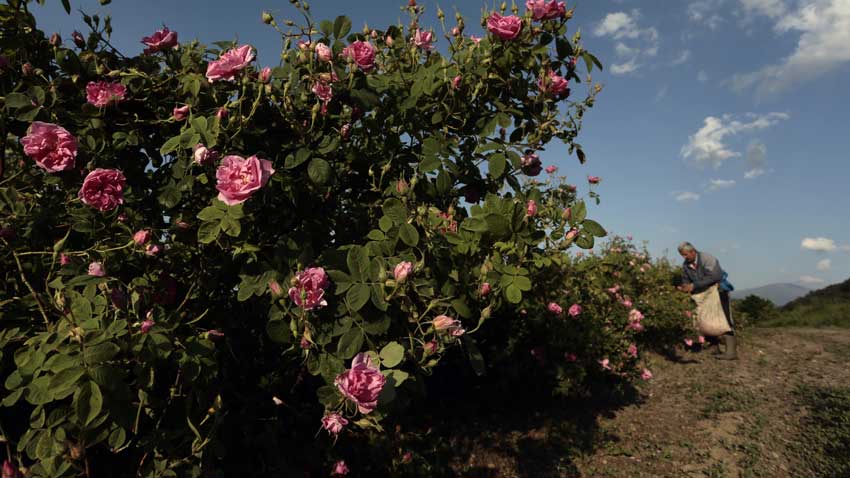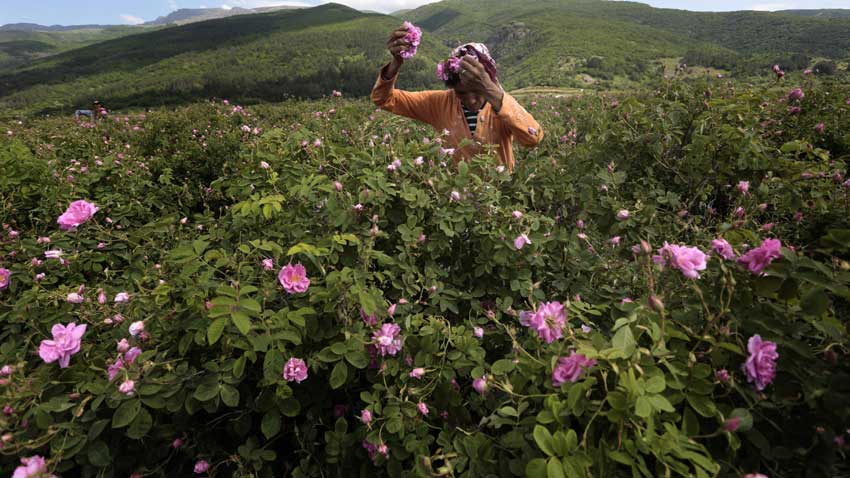The rose-picking season goes through dramatic turns in 2014. The warm winter and early spring promised a shorter rose-picking campaign which favors the extraction of excellent quality rose oil. The weather however, did not keep its promises. The middle of the rose-picking season was accompanied with torrential rain, especially at the end of May. The rose campaign dragged on and will probably exceed its average duration by ten days or so. What is even worse, the excessive moisture reflects negatively on the quality of the rose blossom and its purchase price.
As a whole, the yield is abundant, says Mano Manov who is the mayor of Kliment village situated in the Rose Valley. The local Bio Bulgaria Oil cooperation has launched there in 2000 the first small distillery for the manufacture of organic rose oil. Nearly all families in the village have rose gardens where they earn some extra money.
“The yield is good, but some of the rose flowers may not blossom due to the low temperatures and the high humidity”, Mr Manov adds. “The purchase price of the rose flowers is EUR 0.50 lower as compared to 2013. The large processing companies push the price down and the small ones offer a slightly higher price. That is why we sell this year mainly to small companies.”

The price of the Bulgarian rose oil which is the best quality worldwide was at record highs over the past five years. It cost EUR 4,200 per kilogram in 2009. In 2013 it was sold for EUR 7,200 per kg. This encouraged many owners of rose gardens in Bulgaria to expand their lands planted with rose flowers. The lower price of the rose blossoms this spring will cool the enthusiasm of many people and the expansion will eventually stop, mayor of Kliment village forecasts.
The record highs of the rose flowers registered in 2013 will obviously not repeat and the price is to dwindle from now on. Some of the “aromatic gold” (nearly 25%) remained unsold. That is why the prices are much lower this year as compared to 2013. The rose oil is a very durable product, experts claim. However, that is not the case with the rose blossoms. That is why the growers of rose flowers suffer the most when the market of rose oil shrinks.
According to the CEO of the Bulgarian National Association Essential Oils and Perfumery Nikolina Uzunova, the world market of rose oil is currently in a very delicate state.
“The weather is damper than necessary for the production of a good quality rose blossom. The torrential rain stretched the rose-picking season, the blossoms are quite moist and this reflects negatively on the quantity of rose flowers needed for the manufacture of one kilogram of rose oil.”
Bulgaria and Turkey are currently the world leaders in terms of rose oil production. However, the quality of the Bulgarian Rose oil remains the best, Mrs Uzunova contends. It contains a wide range of nearly three hundred aromatic components. This is mainly due to the specific weather and soil conditions in the Bulgarian Rose Valley near the town of Kazanlak (Central South Bulgaria), as well as the country’s century-old traditions in this sphere.

“The Bulgarian rose oil continues to be the most popular on the world market. It remains a standard of quality worldwide”, claims Nikolina Uzunova.
Each year Bulgaria exports between 1.5 and 2 tons of excellent rose oil. A great part of this rose oil is organic. France which is known for its perfumery industry is Bulgaria’s biggest client of rose oil. Bulgaria also exports to other European countries, the USA, Australia, Japan and China. Rose fragrance is extremely popular in Asia where it is widely used in the confectionery along with traditional sectors such as perfumery and cosmetics.
“Asia is an immense market which attracts the attention of many world companies. The interest of this market in essential oils is also infinite. We are hoping to position well on this market in the future”, concludes Nikolina Uzunova.
English version: Kostadin Atanasov
Photos: BTAWith a growth of 2.2 percent, Bulgaria is among the top 6 countries in the EU, Caretaker Minister of Economy Petko Nikolov reported during the ceremony of presenting the annual awards of the Bulgarian Chamber of Commerce and Industry..
Urgent reform of Bulgaria's planning districts is needed, local authorities insist.The current regionalization shows increasing economic imbalances in terms of EU grant assistance. The problem is particularly severe in the Southwestern region, which..
The final price at which Bulgargaz will sell natural gas in December to end suppliers and to persons with a license for the production and transmission of thermal energy is 75.89 BGN/MWh (excluding excise duty and VAT), the company announced...
Bulgaria is making the necessary progress towards adopting the euro, according to representatives of the European institutions whom Finance Minister..
Financial and tax stability has been shaken in recent years so it is good that a government has been formed, said Vasil Velev, chairman of the Bulgarian..
On January 27th, government securities for 150 million euros (300 million leva) will be offered on the domestic market , the Bulgarian National Bank (BNB)..

+359 2 9336 661
